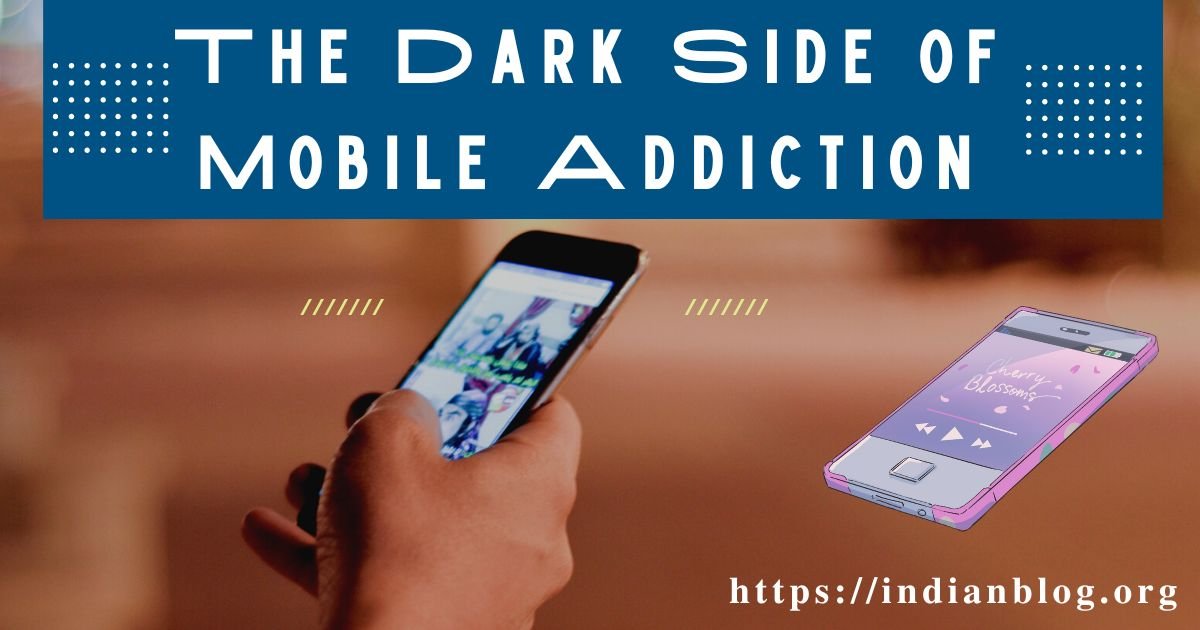Dear Readers, I want to take a moment to raise awareness about the negative consequences of mobile addiction. In today's world, it's easy to get lost in our devices and spend hours scrolling through social media, checking emails, and playing games. But this addiction can have serious consequences for our mental and physical health. So, I encourage you to take a break from your mobile devices and spend some time in the real world. Go for a walk, read a book, or have a conversation with a friend. Your mind and body will thank you for it.
In today’s fast-paced world, it’s easy to get lost in our mobile devices. From social media to emails, gaming to online shopping, we’re constantly connected to our screens. While mobile technology has undoubtedly made our lives easier in many ways, excessive use can lead to negative consequences for our mental and physical health. Studies have shown that excessive use of mobile devices can lead to sleep problems, eye strain, neck and back pain, and even depression and anxiety. It can also interfere with our relationships, as we become more focused on our screens than the people around us. In this blog, we’ll explore the dangers of mobile addiction and provide practical tips for breaking the cycle.
Common Consequences of Mobile Addiction
Sleep Problems
Our mobile devices emit blue light that can disrupt our circadian rhythms and make it harder to fall asleep. Additionally, the constant stimulation from notifications and alerts can keep us up late into the night.
Eye Strain
Staring at a screen for extended periods of time can cause eye strain, dry eyes, and headaches.
Neck and Back Pain
Holding our devices at awkward angles for extended periods of time can lead to neck and back pain, especially if we’re hunched over our screens.
Depression and Anxiety
Studies have shown that excessive mobile device use can lead to depression and anxiety, especially in young people. Social media in particular has been linked to increased feelings of loneliness, envy, and anxiety.
Relationship Problems
Mobile addiction can interfere with our relationships as we become more focused on our screens than the people around us. We may miss out on important moments or fail to give our loved ones the attention they deserve.
Mobile addiction has become a growing concern in our society, and while we all know the physical implications of excessive mobile device use, the psychological effects are often overlooked. Lets explore the psychological effects of mobile addiction and how it can impact our mental health.
The Psychological Effects of Mobile Addiction
Dopamine Dependency
Mobile devices have been designed to be addictive, with endless scrolling and notifications triggering the release of dopamine in our brains. This leads to a dependency on the instant gratification and pleasure we receive from our devices, making it harder to break the cycle.
Anxiety and Stress
The constant need to stay connected and respond to notifications can create a sense of anxiety and stress. This can lead to feelings of being overwhelmed and unable to switch off, even when we’re not using our devices.
Social Comparison
Social media can create a culture of constant comparison, where we’re constantly bombarded with images of perfection and success. This can lead to feelings of inadequacy and low self-esteem, especially in young people.
FOMO
The fear of missing out (FOMO) is a common phenomenon among mobile users, where we feel compelled to constantly check our devices to see what we might be missing out on. This can create a sense of urgency and anxiety that can impact our mental health.
Mobile addiction is a growing problem in our society, and it’s important that we take steps to break the cycle. By setting boundaries, taking breaks, practicing mindfulness, and finding alternative activities, we can reduce our dependence on our devices and improve our mental and physical health. Let’s all strive for a healthier balance between technology and our lives.
Breaking the Cycle
Breaking the cycle of mobile addiction is not easy, but there are practical steps we can take to reduce our dependence on our devices and improve our mental health.
While breaking the cycle of mobile addiction can be challenging, there are practical steps we can take to reduce our dependence on our devices.
Set Boundaries
Consider setting boundaries around your mobile device use. For example, you might decide to turn off your phone during meals or limit your social media use to certain times of the day.
Mindfulness
Instead of mindlessly scrolling through your phone, practice mindfulness by focusing on the present moment. Practicing mindfulness can help us become more aware of our thoughts and feelings, and allow us to make conscious decisions about our mobile device use. Take a deep breath, observe your surroundings, and appreciate the world around you. Take a few minutes each day to practice deep breathing or meditation, and try to be present in the moment.
Digital Detox
Consider taking a digital detox, where you disconnect from your mobile devices for a set period of time. Take regular breaks from your mobile device throughout the day. Get up, stretch, and take a walk outside to give your eyes and body a break from the screen. This can help break the cycle of dependency and allow you to focus on other activities.
Find Alternative Activities
Instead of reaching for your phone when you’re bored or anxious, find alternative activities to engage in. Try reading a book, going for a run, or spending time with friends and family.
Prioritize Relationships
Prioritizing relationships with friends and family can help reduce the feelings of loneliness and social comparison that come with excessive mobile device use. Make time for face-to-face interactions, and limit your mobile device use when you’re with others.
Seek Support
If you’re struggling with mobile addiction, consider seeking support from a mental health professional or support group. They can provide you with the tools and strategies you need to break the cycle and improve your mental health.
Mobile addiction can have serious psychological effects on our mental health, and it’s important that we become more aware of the issue. By practicing mindfulness, taking digital detoxes, prioritizing relationships, and seeking support, we can reduce our dependence on our devices and improve our mental well-being. Let’s all strive to find a healthier balance between technology and our lives.


